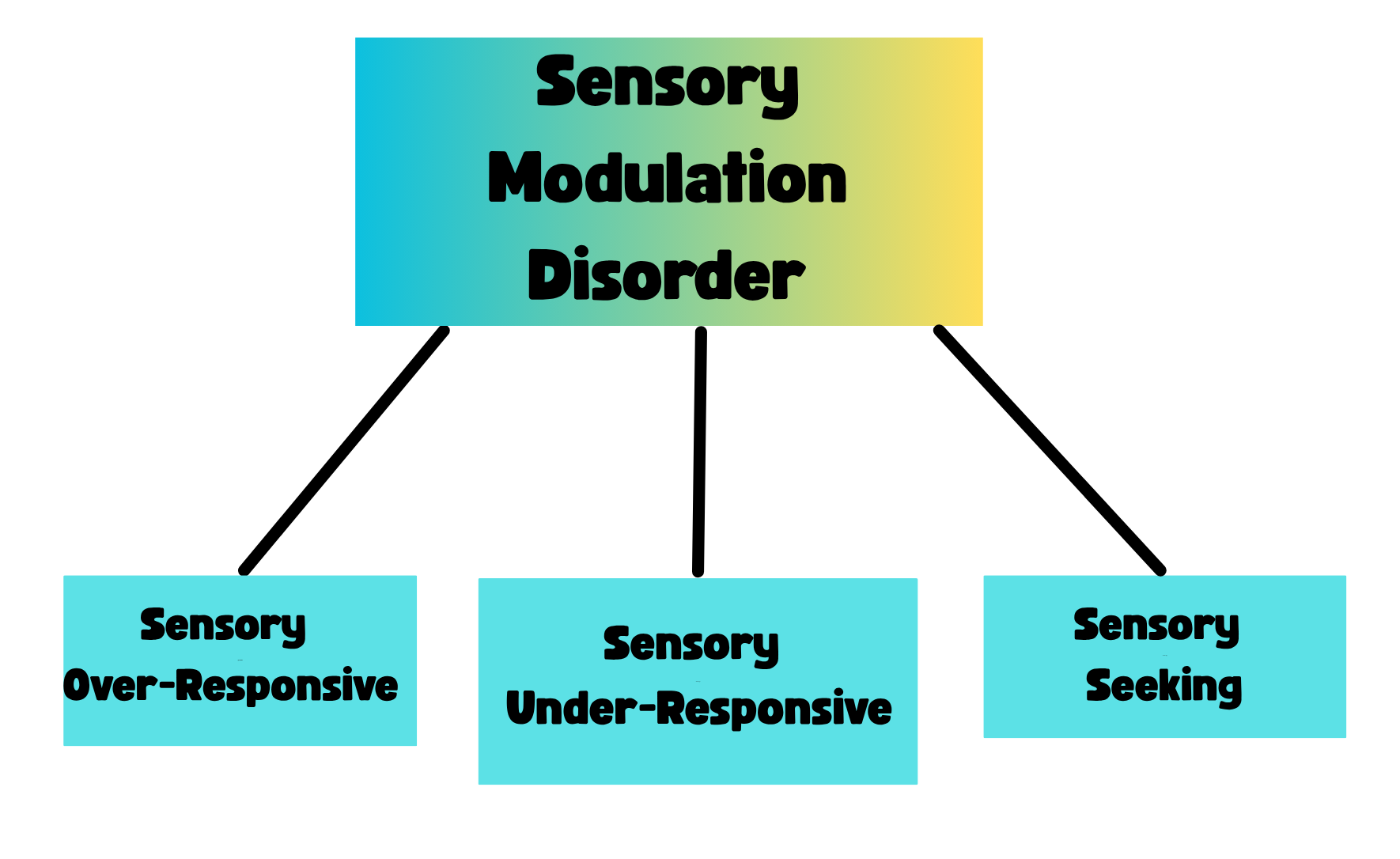Sensory Modulation Disorder:
Understanding the Symptoms, Causes, and Treatment
Sensory Modulation Disorder (SMD) is a condition that falls under the broader umbrella of Sensory Processing Disorder (SPD). It can often be misinterpreted as ADHD or Autism Spectrum Disorder (ASD) due to overlapping symptoms. However, SMD can exist independently or alongside these conditions, making proper diagnosis and understanding crucial.
In this comprehensive guide, you’ll learn to recognize the signs of sensory modulation difficulties, how they differ from other neurodevelopmental disorders, and what treatment options are available—so you can better support a child who may be struggling with sensory challenges.
What Is Sensory Modulation Disorder?
As one of the most commonly diagnosed subtypes of Sensory Processing disorder, Sensory Modulation Disorder refers to a person’s difficulty in appropriately responding to sensory input from the environment. Sensory input includes stimuli such as touch, sound, movement, taste, smell, and visual information. In children with SMD, the brain does not process these sensory messages in an organized way, resulting in extreme or inconsistent reactions.
A child with SMD may be:
- Overreactive (Sensory Defensive)
- Underreactive (Low Registration)
- Sensory Seeking (Craving intense sensory input)
Often, a child’s responses can fluctuate between these categories depending on the situation, type of sensory input, and other environmental factors.

How SMD Differs from ADHD and Autism
While sensory issues are common in children with ADHD and autism, they are not exclusive to these conditions. Children with SMD may show impulsive or hyperactive behaviors similar to ADHD or delayed speech and social interactions similar to autism. However, their root cause is different.
SMD focuses on how the brain processes sensory stimuli, not necessarily on attention or social communication skills. Misdiagnosis can lead to ineffective treatment, so understanding SMD on its own terms is essential.
Sensory Modulation Disorder is suspected when a child shows symptoms with frequency, intensity, and duration. This means that the symptoms or unusual behaviors occur several times a day, with fixed avoidance or fierce efforts to contact environmental stimuli, and lasts several minutes or longer.
Subtypes of Sensory Modulation Disorder
There are three key subtypes of SMD, each with distinct characteristics:
1. Sensory Over-responsivity (Sensory Defensiveness)
Children with sensory overresponsivity react to sensory input in an exaggerated way. They may feel overwhelmed by sensations that others find neutral or pleasant.
Common signs include:
- Avoiding certain fabrics or tags in clothing
- Discomfort with textures in foods (e.g., mushy, crunchy)
- Aversion to being touched or hugged
- Resistance to activities like swinging, climbing, or hair brushing
- Being easily startled by sounds or lights
These children may appear anxious or irritable and may try to escape from sensory-rich environments.
2. Sensory Under-responsivity
Children with this subtype show little or no reaction to sensory input. They may appear passive, slow to respond, or unaware of what’s happening around them.
Typical behaviors include:
- Not noticing being touched, even if bumped or tapped
- Lack of response to loud noises or bright lights
- Preferring sedentary play, such as sitting and watching rather than participating
- Delayed reactions to pain or temperature
- Seeming withdrawn or "zoned out"
Under-responsivity can make it difficult for these children to engage fully in everyday activities, as they might not register important cues from their environment.

Sensory seekers crave intense sensory input and may appear constantly on the move. Their behavior can look like hyperactivity or impulsiveness, which is why this subtype is often confused with ADHD.
Behaviors often seen include:
- Constant running, jumping, spinning, or roughhousing
- Seeking out loud noises, bright lights, or strong smells
- Enjoying fast movement or extreme positions, like hanging upside-down
- Chewing or mouthing objects well beyond toddlerhood
- Talking loudly or excessively
Sensory seeking can interfere with attention, focus, and appropriate social behavior, especially in classroom settings.
Real-Life Example: When Sensory Issues Affect Speech Development
Children with sensory seeking behavior—especially in the vestibular system (which controls balance and spatial orientation)—may also experience delays in speech development. This can mimic early signs of autism, such as speaking in gibberish or struggling with expressive language.
When my oldest son was younger, an OT that went to our church identified that he likely had SPD at age three. This was after she watched him run in circles aimlessly around the room. He was very verbal, but extremely difficult to understand. After undergoing the Wilbarger Brushing Protocol and therapeutic listening sessions combined with a sensory diet, with her supervision, his speech became more articulate, complex, and functional. Despite this treatment, he continued to show some signs of sensory over-reactivity, especially around July 4th when fireworks were rampant. Later we did another listening program called integrated listening systems and most of his sensory concerns completely disappeared after doing that.
This example highlights how targeted sensory interventions can improve more than just behavioral regulation—they can also enhance communication, emotional regulation, and overall development.
Why Early Recognition Is So Important
Identifying sensory modulation difficulties early is key to helping children thrive. SMD symptoms usually appear in early childhood and can intensify over time if not addressed. Children with untreated sensory challenges often struggle with:
- Academic performance
- Social interactions
- Emotional regulation
- Self-esteem and confidence
Importantly, these children are not being defiant or inattentive on purpose. They may be overwhelmed, under-stimulated, or trying to self-regulate in the only way they know how.
How Is Sensory Modulation Disorder Diagnosed?
There is no medical test for SPD or its subtypes. Diagnosis typically involves:
- Parent and teacher questionnaires
- Clinical observations by an occupational therapist (OT)
- Standardized sensory processing assessments
To meet the criteria for SMD, behaviors must occur frequently, be intense, and last for a significant duration—often multiple times a day over weeks or months.
Treatment for Sensory Modulation Disorder
The most effective treatment for SMD is occupational therapy (OT) with a therapist who specializes in sensory integration. OT helps children learn how to regulate their responses to sensory input using fun, engaging activities tailored to their needs.
Treatment may include:
- Sensory integration therapy
- Wilbarger Deep Pressure and Proprioceptive Techniques (Brushing Protocol)
- Therapeutic listening programs
- Vestibular and proprioceptive exercises
- Home-based sensory diets
Working closely with a sensory-trained OT can help you create a consistent plan both at home and in school to support your child’s success.
Final Thoughts
Sensory Modulation Disorder is more than just picky eating or high energy. It's a neurological difference that affects how children interact with the world around them. With the right knowledge, support, and professional guidance, children with SMD can develop better self-regulation skills, improve their daily functioning, and live happy, fulfilling lives.
If you suspect your child might be experiencing sensory challenges, consult a qualified occupational therapist to begin the journey toward better understanding and healing. Early intervention can make all the difference.
If you haven't already, be sure to check out my ebooks, now on Amazon!
References
1. Kranowitz, C. S. (2005). The Out-of-Sync Child: Recognizing and Coping with Sensory Processing Disorders. New York, NY: Penguin Group.

